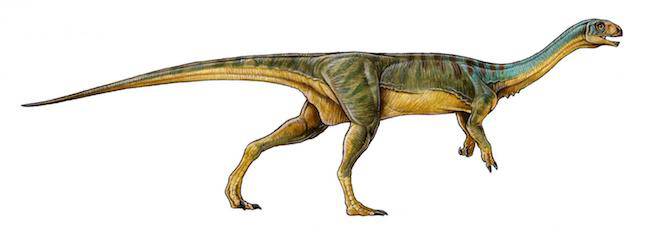Scientists in Chile are puzzled by the discovery of a diminutive new vegetarian dinosaur which, they say, was closely related to the infamous meat-eating Tyrannosaurus rex. The finding is particularly notable for the vegetarian discovery, as the overall structure of the creature looks more like its meat eating cousins than traditional vegetarian dinosaurs.
Specimens of the strange, dwarfish Jurassic creature, dubbed Chilesaurus diegosuarezi and nicknamed ‘platypus’, reveal that the newly uncovered dinosaur was typically the size of a turkey, though some grew to around nine feet long.
According to the Chilean and Argentinian paleontologists, whose paper was published in the journal Nature on Monday, said the platypus discovery shows that a meat free diet was acquired much earlier than had been previously thought.
Martín Ezcurra, a dinosaur researcher at the University of Birmingham, said:
“Chilesaurus can be considered a “platypus” dinosaur because different parts of its body resemble those of other dinosaur groups due to mosaic convergent evolution
In this process, a region or regions of an organism resemble others of unrelated species because of a similar mode of life and evolutionary pressures. Chilesaurus provides a good example of how evolution works in deep time and it is one of the most interesting cases of convergent evolution documented in the history of life.”
The ‘platypus’ was found to have a strange mixture of “bizarre” characteristics from different dino groups, the boffins noted, including a small skull and two fingers, just like the larger T-rex.
In a heartwarming twist, the fossil remains of the small, plant-eating creature were dug up by a 7-year-old child named Diego Suárez, who was at the Toqui Formation in Aysén, south of Chilean Patagonia with his parents, who happen to be geologists.
Lead researcher Dr Fernando Novas said:
“The recurrent discovery in beds of the Toqui Formation of its bones and skeletons clearly demonstrates that Chilesaurus was, by far, the most abundant dinosaur in southwest Patagonia 145 million years ago.”
Stay Connected
